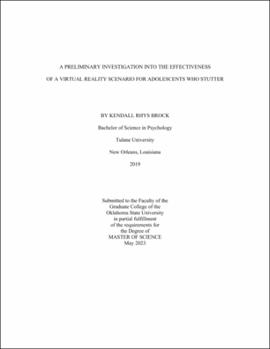| dc.contributor.advisor | Tetnowski, John A. | |
| dc.contributor.author | Brock, Kendall Rhys | |
| dc.date.accessioned | 2023-08-25T20:06:43Z | |
| dc.date.available | 2023-08-25T20:06:43Z | |
| dc.date.issued | 2023-05 | |
| dc.identifier.uri | https://hdl.handle.net/11244/338980 | |
| dc.description.abstract | Stuttering is a fluency disorder that is often a lifelong diagnosis, posing challenges in communication and quality of life for people who stutter (PWS). Various interventions have been developed to address these issues, but many approaches have been unable to extend the benefits of therapy into real-life environments. Virtual Reality (VR) has the potential to bridge the gap between the clinical and outside success, but the benefits are restricted by accessibility, portability, and affordability. | |
| dc.description.abstract | This preliminary study’s goals are to test the efficacy of a low cost and portable VR system. The objective is to nurture the continued practice and carryover outside of the clinic for adolescents who stutter. The study research questions are as follows: 1) What is the impact on stuttering skills following an at-home trial program using VR in a school-based scenario? 2) What is the impact on affective and cognitive feelings (as measured by a biological marker) following an at-home trial program using VR in a school-based scenario?
3) What are the lived experiences of the PWS following an at-home trial program using VR in a school-based scenario? | |
| dc.description.abstract | Utilizing a pre-post design with three school aged PWS, the participants will receive a VR-based therapy set in a classroom environment. The participants will practice at least five days a week for two weeks. Outcome measures include stuttering severity, affective and cognitive feelings, and the lived experience of the PWS. The results indicate that VR, as an intervention, can promote PWS communication and quality of life. VR has the potential to bridge the gap between the clinic and real-life success. | |
| dc.format | application/pdf | |
| dc.language | en_US | |
| dc.rights | Copyright is held by the author who has granted the Oklahoma State University Library the non-exclusive right to share this material in its institutional repository. Contact Digital Library Services at lib-dls@okstate.edu or 405-744-9161 for the permission policy on the use, reproduction or distribution of this material. | |
| dc.title | Preliminary investigation into the effectiveness of a virtual reality scenario for adolescents who stutter | |
| dc.contributor.committeeMember | Parveen, Sabiha | |
| dc.contributor.committeeMember | Kaipa, Ramesh | |
| osu.filename | Brock_okstate_0664M_18184.pdf | |
| osu.accesstype | Open Access | |
| dc.type.genre | Thesis | |
| dc.type.material | Text | |
| dc.subject.keywords | adolescents | |
| dc.subject.keywords | fluency | |
| dc.subject.keywords | stuttering | |
| dc.subject.keywords | virtual reality | |
| dc.subject.keywords | VR | |
| thesis.degree.discipline | Communication Sciences and Disorders | |
| thesis.degree.grantor | Oklahoma State University | |
